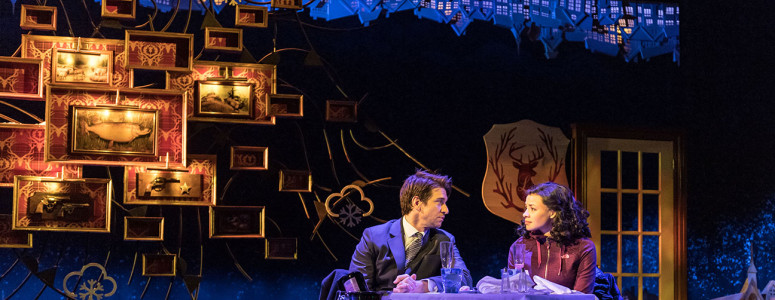Does Phil Connors EVER shower?
When the “hero” of GROUNDHOG DAY: THE MUSICAL arises at 6 a.m. in his bed-and-breakfast room, we see that he’d gone to sleep in his undershirt, boxer shorts and socks. Without a thought to a shower, Phil then immediately puts on his trousers, shirt, shoes, jacket and overcoat and goes off to work.
No wonder he’s always seen sleeping alone.
To be fair, there is a later moment when Phil does take to the shower, albeit long after he’s been awake. Frankly, this scene is well worth waiting for and not simply for those who value hygiene. The shower scene leads to a dazzling “coup de théâtre” – a term we don’t often have occasion to use. Happily, GROUNDHOG DAY gives us the opportunity.
But day after day after day after day, Phil doesn’t go to the bathroom, even for as much as a urination. Most of us aren’t surprised, however, that the scene is repeatedly repeated, for we have known the plot of GROUNDHOG DAY since 1993, when we were first introduced to the beloved film.
Danny Rubin’s story of a TV weatherman who relives February 2nd over and over again is now a musical. The new show at the August Wilson Theatre occasionally augments but more often muddies what the movie did so well.
The show gets off to a strange start, for composer-lyricist Tim Minchin gives the citizens of Punxsutawney, Pennsylvania a doleful melody. No, the song should reflect their high spirits for being in the nation’s consciousness this one morning. Even if their cherished groundhog sees his shadow, the townspeople will have their day in the sun. Joyousness should permeate the song.
We don’t expect Phil’s opening song to contain any joy, for he’s utterly contemptuous of a small town’s people and their lifestyle. “There are haystacks and horses where there should be golf courses,” he sings before proclaiming to a waitress “You couldn’t pay me to stay here one more night.”
An unexplained fate has a different plan for him. Although each day Phil remembers the past, he’s condemned to repeat it. By Night Three, the third time is hardly the charm, for he starts having panic attacks. Phil and we will travel a long road before he learns how to become a good man and redeem himself.
On stage, Phil’s redemption takes about a half-hour longer than it did in the multiplex. His blatant sexual harassment is now even more lamentable than it was in 1993, in those pre-Clinton-and-Lewinsky days. As we now hear such charges against a media figure who’s far more powerful than Phil, it’s not only a bitter pill to swallow but also a series of painfully awkward scenes.
Films since IT’S A MAD MAD MAD MAD WORLD have enjoyed speeding-car chases, which aren’t remotely possible on stage. And yet, someone on staff – perhaps able director Matthew Warchus? — had a very bright idea on how to create one here that’s both exciting and endearing.
Rubin, in adapting his screenplay into a libretto, has added some extra jokes, all of which are good. Meanwhile, Minchin might have thought twice about a song in which Phil laments that given his lifetime sentence in Punxsutawney “I’ll never see the ocean.” Why not? He’s demonstrated time and time again that he can do anything he wants each and every day; the only caveat is that he must start from scratch the next morning. Every “new” February 2nd offers him the opportunity, luxury and power to do whatever his oh-so-little heart desires, so why not take the 90-minute drive to Pittsburgh and catch a flight to Boston where the Atlantic awaits?
This lyric mistake is an anomaly. Despite Minchin’s occasional triteness (“I’m seeing you for the first time!” … “And when you smile, you get this crease in your nose”), he emerges as half a Sondheim. Like the master, his lyrics more often have an abundance of fresh images and cleverness. But despite his wit, he doesn’t care a whit – unlike Sondheim – about finding perfect rhymes and using the right stress on syllables. Minchin avoids the hard work that fine lyrics demand and seemingly settles for anything that fill out a line.
His lack of craft brings to mind a day in 1925 when George S. Kaufman was backstage watching a performance of his musical THE COCONUTS which was starring The Marx Brothers. The foursome ad-libbed constantly and unapologetically, which Kaufman endured. Suddenly he was startled and told the person standing next to him the reason why: “I thought I heard one of my original lines!”
At this musical, those who care about perfect rhymes may be equally as shocked. For after they’ve heard Minchin deliver couplet after couplet with false rhymes, their eyebrows may raise when they hear an oh-so-rare perfect one.
One distinct improvement from the film is Minchin’s giving Rita some introspective songs; the movie doesn’t offer us alone-time with her. Considering that Rita is beautifully and sincerely played by Barrett Doss, these moments are among the finest in the show. Minchin has provided tuneful music throughout, but none more than in her songs.
Andy Karl gives a solid as Phil. The role comes across more as an endurance test, for Karl is rarely off-stage so his getting through it without making it look like hard work is impressive. He’s neither as smug as original Phil Bill Murray nor does he display the esteemed comic actor’s quirky personality that dominates the movie. Still, there’s something in his personality that makes us root for him.
GROUNDHOG DAY may be a disappointment to rabid fans of the film. Even in this guise, however, it can still inspire. If you had endless chances to straighten out your life, would you relish the opportunity, learn the piano, help the homeless and make your neighbors feel better about themselves?
Here’s hoping that you would. What you might not do, however, is see GROUNDHOG DAY: THE MUSICAL ever again.




